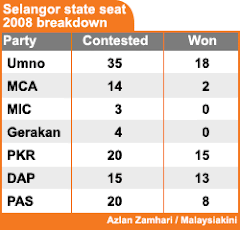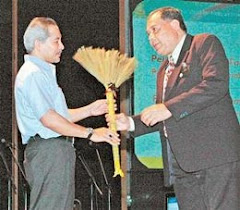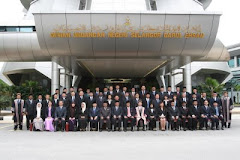Jun 15, 2008 Valley View By GEETHA KRISHNAN
THE current changed political scenario, especially in Selangor, has brought about a sort of grassroots political awakening involving a new perception and a holistic perspective on the role and scope of the local councils and councillors.
The Local Government Act 1976 (Act 171) Section 10 (2) states that “councillors of the local authority shall be appointed from among persons the majority of whom shall be persons ordinarily residents in the local authority area who in the opinion of the state authority have wide experience in local government affairs or who have achieved distinction in any profession, commerce or industry, or are otherwise capable of representing the interests of their communities in the local authority area”.
Section 10 (1) states that “the local authority shall consist of the mayor or president and not less than eight and not more than 24 other councillors to be appointed by the state authority”.
Section (3) stipulates that the term of office of each councillor shall not exceed three years while Section (6) states that a councillor shall be eligible for reappointment upon the expiry of his term of office.
Under previous state governments, it was a tradition of sorts for state assemblymen to be appointed as councillors.
“This was based on the understanding that assemblymen worked closely with local authorities in handling community issues and as such, maintained a better line of communication in dealings,” said a former assemblyman and councillor.
From a wider scope of things, their positions as councillors were clearly viewed as political appointments.
In the 1950s and 1960s, councillors were elected through local council elections but this came to what was supposed to be a temporary halt in 1963 due to the Indonesian Confrontation (Konfrantasi) against the formation of Malaysia.
Local council elections were eventually abolished in 1965 with an amendment to Section 15 of the Local Government Act.
Following the outcome of the 12th general election on March 8 this year, when the Barisan Nasional lost control of four states and failed to unseat the PAS state government in Kelantan, there have been calls to amend the Local Government Act to bring back local council elections.
In Selangor, the new Pakatan Rakyat state government has declared that elected representatives would not be appointed local councillors in the two city councils (Shah Alam and Petaling Jaya) and 12 municipal councils in the state.
The Selangor state executive council, meanwhile, is going through a list of public nominees for councillors comprising professionals and representatives from the NGOs.
Under Section 28 of the Local Government Act, each local authority may, from time to time, appoint committees, either of a general or special nature, consisting of a chairman, councillors and such other persons as it may deem fit.
The new batch of councillors for the two city councils and 12 local councils in Selangor are also expected to sit in the relevant committees, rendering their expertise in areas like licensing, building, infrastructure and finance.
Each of the councillors of the previous administration used to serve in at least two to four committees.
Their selection to the committees is based on recommendations made by the state leaders of their respective political parties.
Section 28 also states that councillors shall be paid allowances determined by the local authority.
Contrary to general public perception, councillors are paid only a miserable monthly allowances ranging from RM500 to RM650. Not something to shout about!
An additional of RM50 or RM100 is paid for each attendance at the monthly full council meetings or a committee meeting.
According to a former councillor, each councillor was given an annual grant of RM10,000 to spend on projects in his or her area.
“But the amount was hardly sufficient for big projects.
“We usually organised gotong royong, talks and small community events and even had to fork out our own money for these events,” he said.
In the awarding of contracts, Section 34 (1) of the Local Government Act clearly states that any councillor with a pecuniary interest, whether direct or indirect, in any contract or proposed contract should withdraw from the meeting where the matter is under consideration.
There have been allegations from the public that the previous elected representatives strongly influenced decisions on the awarding of contracts in Selangor.
The present Pakatan Rakyat state government has recently announced that assemblymen and politically-appointed local councillors would no longer be allowed to sit on tender boards.
All that remains now is to keep our fingers crossed as the list is finalised and hope that better days are ahead for Selangor.
Subscribe to:
Post Comments (Atom)










No comments:
Post a Comment